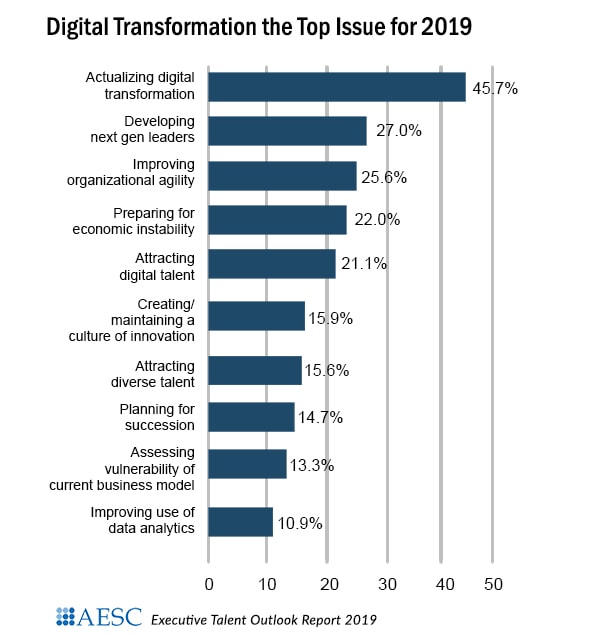
The Evolving Role of Senior Executives in the Digital Age
The digital age has ushered in unexpected changes, transforming the very fabric of how organizations operate. Let’s unravel the evolving role of senior executives in
As trusted advisors to organizations worldwide across industries, AESC Members help attract top executive talent, advise boards and develop internal talent for leadership roles. Thus, they are in a unique position to gauge the pulse of the global business climate.
AESC’s Global Executive Talent Outlook 2019 outlines business intelligence for C-Suite leaders related to talent trends and new opportunities in the market. AESC Member consultants share input on top organizational challenges and opportunities business leaders are facing and forecast industry, functional and geographic market trends.
Compared to findings from our Executive Talent Outlook 2018, AESC Members cast a cautious outlook for 2019. Geopolitics contribute to the cautious mood projected by AESC Members for the year ahead. Uncertainty exists in the European markets as a post-Brexit reality looms. The United States enters a new Presidential campaign cycle setting into motion an unknown for the country’s political future. India, Indonesia, South Africa, Argentina and Canada will all hold significant elections in 2019, likely having an impact on their national economies as well as the global economic fabric.
Nevertheless, AESC Members point to a global business environment rife with opportunity spawned by an abundance of new technologies. More than ever, digital is driving demand for agility, innovation and diversity.
Digital is the Status Quo for C-suite Leaders
The rapid proliferation of new technologies, from AI and IoT but now also 5G and quantum computing, are disrupting the global business landscape. 46% of participants believe that actualizing digital transformation will be the number one business issue for organizations in 2019. In AESC’s Leading Transformation: Shaping the C-Suite for Business 4.0 Innovation, we identified that too many organizations lack a thorough understanding of what a transformation means for their businesses, preventing them from actualizing digital transformation across the enterprise.

In addition to having a deep understanding of the type of transformation required for their organizations, business leaders must also foster organizational cultures conducive for innovation, while at the same time attract and develop digital talent. 65% of participants predict that Technology/ Analytics/ Cybersecurity will be the most in-demand function this year. While demand for relatively new roles like Chief Information Security Officers and Chief Digital Officers continue to grow, a new need for digital expertise has emerged across the C-Suite. From CEOs and CFOs to Chief Marketing Officers, today’s leaders must understand the business opportunities presented by emerging technology.
Agility Accelerates Leadership from Next Gen Talent
Today’s C-Suite leaders are aware of the critical need for organizational agility, being able to seize upon opportunities when they emerge and quickly shift strategic direction when required. However, new technologies create difficulty for some organizations to keep up.
The demand for agility also means more organizations are looking to the next generation of leaders for the digital talent they need to flourish in a Business 4.0 environment. A drive for digital fluency means more talent from the younger half of Generation X and the Millennial generation are taking on C-Suite roles at a growing rate. This is also changing the cultural makeup of organizations as they look to foster innovation and a diversity of thought. As younger talent brings digital skills but often less management experience than their predecessors, organizations are increasing their learning and development programs, preparing high potential talent within their organizations for leadership roles.
Digital Leadership: A Growing Business Service
As organizations focus on actualizing digital transformation across the enterprise, C-Suite leaders are increasingly turning to external trusted advisors to help deliver and develop the digital talent they need. Advisory firms are developing digital competency models specific for a client's organization, assessing talent gaps and benchmarking spaces in the marketplace. 'Digital leadership' is ranked as the fastest growing business advisory service for 2019.
Customer value creation, CEO succession planning and board diversity are top issues for today's boards of directors. Organizations are more conscious than ever of their board reflecting their customer base, which means a stronger drive for gender balance and all forms of diversity including age, ethnicity and diversity of thought. In 2019, boards seek to ensure relevancy, diversity and digital fluency in the boardroom.
The full Global Executive Talent Outlook 2019 with more insights and predictions from AESC members globally is available to BlueSteps members. To access it, along with more insights, reports and guides, become a member.

The digital age has ushered in unexpected changes, transforming the very fabric of how organizations operate. Let’s unravel the evolving role of senior executives in

As navigators of corporate strategy, your boardroom decisions carry significant weight, shaping the trajectory of your organization. But you already know that. In this blog,
